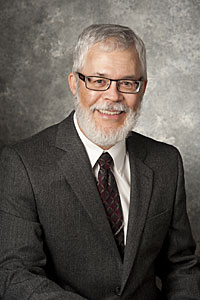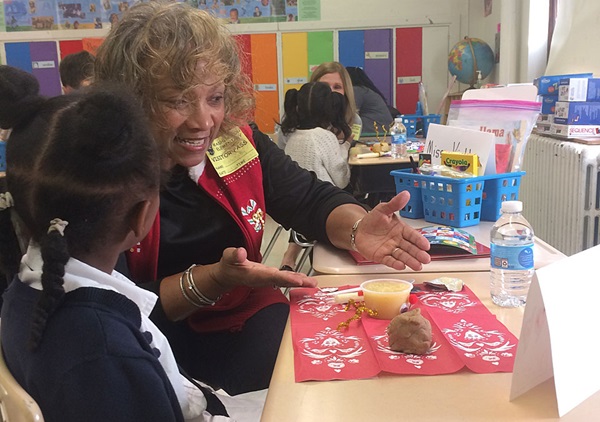When new members join The United Methodist Church, they profess the vows of the Baptismal Covenant. They promise to be loyal to Christ through the global United Methodist Church and to be active participants in a local congregation, pledging "to faithfully participate in its ministries by their prayers, their presence, their gifts, their service and their witness."

The Rev. Mark Stamm. Photo courtesy of Courtesy Perkins School of Theology
The word "witness" was added by the 2008 United Methodist General Conference to highlight the mission and evangelistic responsibilities of church membership. It also reminds United Methodists to live out their vows publicly, said the Rev. Mark W. Stamm, professor of Christian worship at Perkins School of Theology at Southern Methodist University in Dallas.
"All of those (others) can be done fairly privately," he said. "If we're making disciples for the transformation of the world, then we need to remind ourselves that this isn't just an act of piety that we do privately ... Among the people with whom we worship God — our local church — we're called to live the gospel publicly in ways that can be seen. And that's what witness is all about."
Stamm, author of Our Membership Vows, a Discipleship Ministries resource, said churches individually need to discern how they are going to do that in a specific way and a specific place.
One of the ways The Gathering United Methodist Church in St. Louis is witnessing to its community is through the Literacy Project. The reading mentor program teaches kids to read and provides support to school staff and families.
"We are committed to impacting the literacy rate in St. Louis Public Schools," said Sabra Engelbrecht, executive director of ministries at The Gathering, a multisite congregation with more than 700 members and 1,200 in weekly worship. "Our witness is being present in some of the lowest performing schools in our state — places that the public has largely overlooked or forgotten."
{full_page_ad}
Through witness and outreach ministries like the Literacy Project, churches can offer members a way to uphold their membership vows. Finding local mission work that they are passionate about both connects them with their community and strengthens their commitment to supporting the church in concrete ways.
Remind people of vows
Continuing to talk about membership responsibilities also is important.
Engelbrecht said The Gathering creates a culture around five shared practices: worship, learning in CoreGroups, prayer, service and giving.
"We reference these practices regularly in weekend teaching, as well as develop sermon series to highlight particular practices. ... CoreGroups, our adult small group ministry, reinforce these practices, and our curriculum is designed to equip people to engage in these practices. We currently have close to 800 adults participating in CoreGroups," she said.
Stamm, a third-generation United Methodist elder, said Lent is a great time to study the Baptismal Covenant and explore how to live out those promises faithfully.
"We commit at baptism to resist evil and repent of our sin. We commit to resist injustice and oppression and work against them. So the question is: ‘Where is the injustice in the place that we live? What does it look like here? Do we have the courage to name it where we're living? And if we name it, then, what would resisting it look like?'
"You can come up with all kinds of examples," he said. "Once you start the conversation — start asking what does it look like to do this vow where we are living — you do that and you trust people, (they) will start to get it."
Stamm recalls a story from his book Devoting Ourselves to the Prayers: A Baptismal Theology for the Church's Intercessory Work about the Sisters of the Precious Blood, a group of Catholic nuns in Dayton, Ohio.
The sisters were distraught after a series of murders in their area in the early 1990s. After watching the local news one night at the convent, he said, some of the sisters looked at each other and remarked, "Isn't that awful? Someone ought to do something."
"Well, when you say something like that in God's hearing, guess who that someone often is," Stamm said.
The women answered God's call to action. They began holding prayer vigils every time there was a new murder. However, they took it a step further by gathering at the crime scenes, which were often in dangerous locations. It was risky, but they wanted to make sure that fear and violence didn't get the last word, Stamm said.
The vigils eventually became an ecumenical endeavor and continue to this day.
Identifying the needs in a community and taking action is what witness is all about. United Methodist congregations are doing that every day, whether it's providing sanctuary for immigrants, offering after-school care for at-risk kids, helping the homeless or standing up for the marginalized.
"That's witness, when you do things like that. You do them publicly. You discern as a congregation that this is the particular way that God is asking us to be faithful to our baptismal vows in this place," Stamm said.
Live your witness
United Methodists also can witness outside of church structures to co-workers and neighbors.
"If we can be relieved of thinking we have to somehow become particularly articulate theologically to witness, if we can get past that ... We're not asking people to be amateur preachers and teachers ... we are asking them to live consistently with the gospel," Stamm said.
Leading a Christian life by example is a form of witness, whether it's acting with integrity in the workplace, showing compassion to neighbors, or helping others embody the love of Christ through advocacy and outreach.
New United Methodist Jill Schmalz, who became a member of The Gathering last fall, is living out her faith through volunteering, small group ministries and Christian education classes. She said there are easy ways to witness in day-to-day life.
"Sometimes, it can be as simple as including church attendance when discussing your weekend plans. ... People are curious, and most of us have experienced that longing for a greater purpose or understanding in life. When you make yourself approachable and are willing to listen, people will ask about faith. ... I am glad to share my story with others," she said.
Engelbrecht highlights the work of another church member, Debbie Johnson, who organized a network of Allstate insurance agencies to spearhead a $30,000 renovation of the library at Peabody Elementary, the lowest-performing school in the city of St. Louis.
Prior to the dedication of the library, in a video for The Gathering, Johnson reflected on the impact of a community coming together.
"We're touching the lives of hundreds of kids, not only the kids that attend the school today but also the kids that are going to walk through these doors for years to come," Johnson said. "I am so very happy and blessed to be a part of this, but it wasn't me. I wasn't enough. I was able to get the help of 29 other Allstate agency owners to join me."
Engelbrecht said The Gathering encourages and equips its members to be "agents of invitation" at work and in their communities. "By sharing with others the transformation that we have experienced at The Gathering, we partner with Christ to increase his kingdom," she said.
Stamm agrees that the rewards are far-reaching, and it begins with people believing they can make a difference.
"Any kind of positive intervention in a system can begin to change the whole system," he said. "Positive witness in any particular place can begin to change the community. It really can."
Julie Dwyer is general church content editor at United Methodist Communications.

